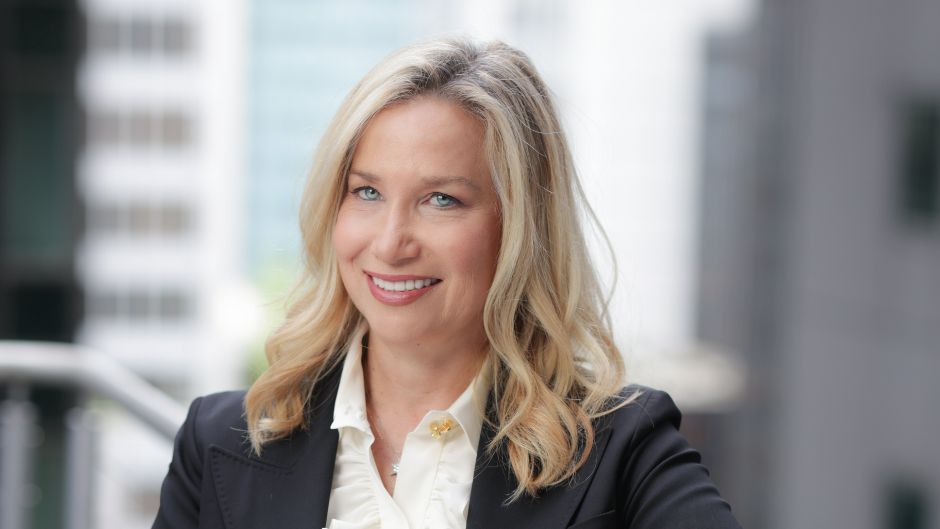Nancy Chemtob, J.D. ’90, was just 13 years old when her father died. The family was living in Long Island, New York, and her mother was suddenly responsible for caring for two young daughters.
To do so, her mother turned a hobby into a business, running The New York Antique Almanac newspaper, which became the primary source of income for the family. Chemtob also had to pitch in, working as wait staff at a catering hall, making chocolate treats at a candy store, and working as a sales associate in a clothing store.
However agonizing that period was, Chemtob says the experience taught her the lessons she needed to become one of the leading divorce attorneys in New York. Watching her mother expand her tiny trade paper into a money-making publication delivered nationwide taught her the value of hard work and self-sufficiency.
“My mother wasn’t the breadwinner, and all of a sudden she was,” Chemtob said. “My mom made it very clear to my sister and me that you just need to rely on yourself, take care of yourself and your family.”
That period also showed Chemtob the importance of family stability, even though she learned the lesson only by losing hers. Now, whenever a client approaches her to initiate divorce proceedings, one of her first questions is always about the children.
“It was awkward being a young girl growing up without a father,” she said. “I just always had the sense of how important it was to make kids feel safe. I think that’s why I care so much about family outcomes.”
Put it all together, Chemtob has become one of the go-to divorce attorneys for Manhattan’s wealthiest clients. She estimates her average client has a net worth of $15 million, her top clients reaching $1 billion. She has handled groundbreaking cases, expanding fathers’ rights during divorces, helping LGTBQ+ couples grow their legal rights, and now navigating the confusing world of parental rights after families moved around the country, and the world, due to the COVID-19 pandemic.
When asked how she has managed to thrive within the competitive, cutthroat world of the New York legal scene, Chemtob points south to her time at the University of Miami School of Law.
Her Time in the Sun
After wading through the snow to earn her bachelor’s degree at Syracuse University, Chemtob figured Miami Law was an excellent next step, where she could earn her law degree while lounging under the South Florida sun. But she learned she wouldn’t be spending her days poolside in her first week.
"I realized I was in an incredibly tough and academically challenging environment," she said. "It was crazy times where people were ripping pages out of books. We would have a case study to do, you’d go to the library and the book wasn’t there. It was incredibly competitive.
"I literally never saw the pool,” she said.
Chemtob experienced another shock when she ended up in a courtroom litigating cases, something she never expected to do. Coming from a family of real estate attorneys—her father and sister both practiced in that field—she assumed she would follow that path. Her first experience in moot court at Miami Law drove that point home.
“I bombed,” she said. “I said, ‘May it please the court, my name is,’ and I froze. I thought (my partner) was going to kill me, thankfully she ended up graduating No. 2 in the class.”
But just as Chemtob was graduating in 1990, the real estate and stock markets crashed, prompting real estate firms to lay off attorneys, not hire them. Luckily, she worked for an uncle doing trusts and estates for a time, applied all over, and then landed in a New York employment firm litigating workers’ compensation cases.
“I would go to court in the morning, get 15 files and I had no idea what I was doing in a courtroom,” she said. “I learned to litigate that way.”
Charting Her Path
She did that for five years, building the experience, confidence, and connections she needed to start her firm Chemtob, Moss, Forman & Beyda. She has built up a massive list of wealthy clients, a list that has exploded during the pandemic.
Couples who spoke for maybe 20 minutes during a typical day were around each other 24/7. Parents realized they had drastically different views on raising their children. And while many used COVID-19 as an opportunity to reinvent themselves and their careers, some decided being married wasn’t part of that new life.
All told, Chemtob’s caseload increased 30% during the pandemic.
“I feel like everybody got divorced,” she said.
As the pandemic eases into an endemic, Chemtob is looking ahead to giving back to her law school. She wants to continue her work advocating for children’s mental health—she’s on the board of directors at Mount Sinai Children’s Center Foundation. And she remains active at Miami Law, serving on the Dean’s Advisory Council.
With one of her three sons recently moving to Miami, she wants to teach classes at Miami Law and start a family law clinic to give back to the school that got it all started for her. “It’s really important to me because I’m so grateful to the law school and the education that I got there,” she said.

